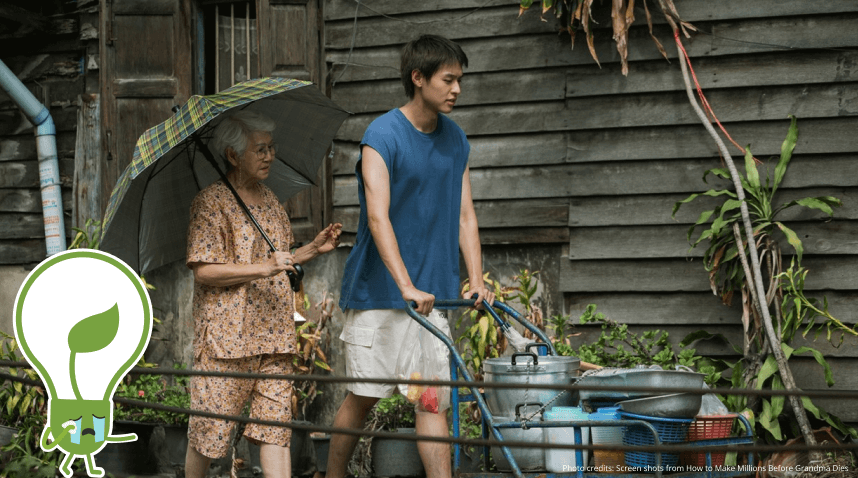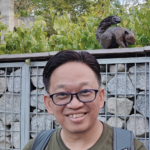TLDR: Death is often seen as a tragic outcome in a person’s life. What if death allows us to better appreciate Impermanence, Right View, Right Effort, and Gratitude?
SPOILER ALERTS! This article contains spoilers!
The movie “How to Make Millions Before Grandma Dies” is a Thai family-themed film that skillfully blends humour with poignant moments of love, compassion, joy, and equanimity. Proceed with caution, as some minor spoilers will be shared here.
Check out the movie trailer here. (The trailer alone is a tear-jerker; prepare your tissues!)
The movie centres around a grandson, M, and his maternal grandmother, Ah Ma. M competes to become Ah Ma’s favourite, devising a plan to surpass Ah Ma’s three children to secure the largest portion of her inheritance – the ancestral home before Ah Ma succumbs to cancer.
M and Ah Ma had many hilarious and mind-bending interactions. They show us how their relationship evolved from M’s initial feelings of Greed, Aversion, and Ignorance towards Ah Ma and Ah Ma’s initial distrust and scepticism of M’s intentions to a deep bond of love and joy, cherishing the shared moments in life.
Impermanence
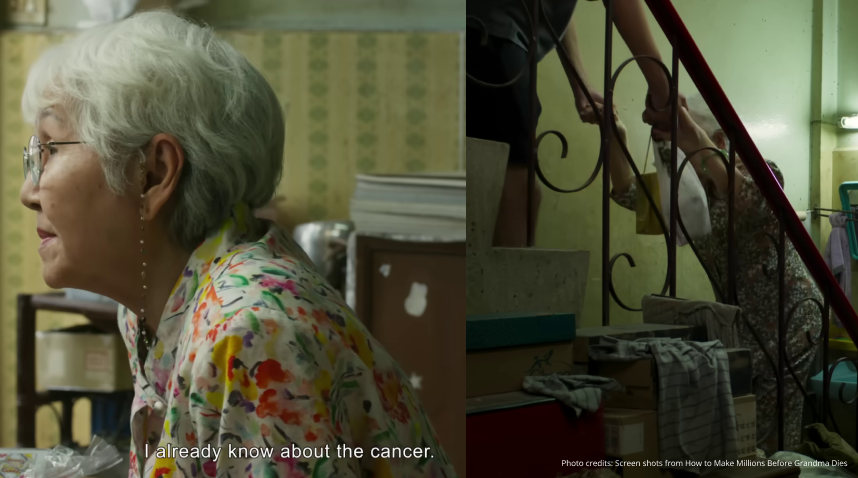
We celebrate birth, yet we cry over death. birth and death come as a pair. Death casts a shadow over us from the moment of birth. As Buddhists, the Buddha encourages us to contemplate death as one of the 5 Recollections that we should regularly reflect upon. There is no guarantee that we will live to a long, ripe age. ‘
Once in Ajahn Brahm’s retreat at Jhana Grove in Australia, Ajahn Brahm somberly stated, “One of you may not be alive next year…” and he intones on, “And don’t you all look at the elderly gentleman at the back, for there is no guarantee that the young may not die earlier either!”
M shared with Ah Ma about her cancer diagnosis, which came as a shock to Ah Ma’s three children, who tried to conceal the diagnosis from Ah Ma.
This situation highlights the common fear that adults have when it comes to discussing death with their parents.
My father is a 4-time cancer survivor. I have witnessed his transition from being youthful and active to being slower and weaker; impermanence is revealing itself in my life with my father.
Talking about death and discussing his final wishes with my father, especially at this late stage of his life, remains a sensitive topic for me. It makes me ponder whether it is taboo for me or my parents.
Right View (towards the Elderly):
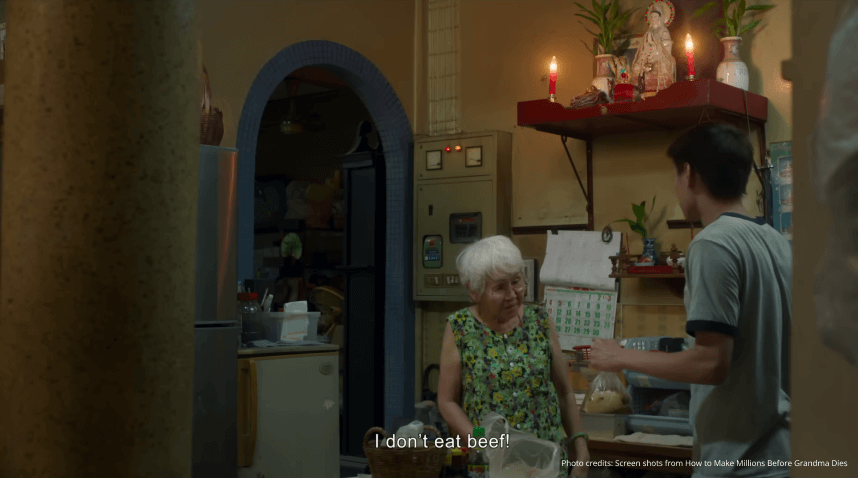
During a discussion with M’s cousin, the topic of the “elderly smell” came up. Sometimes, we might avoid spending time with our aging grandparents or parents just because they “smell” funny. This reflects our aversion to unpleasant odors and our attachment to pleasant fragrances like perfumes.
Worse, some may not even notice any smell at all. Aging is a painful process for the body; it cannot detoxify at the same rate as it deteriorates.
The elderly are conscious of their failing bodies. We do not need to add more hurtful words to their physical discomfort.
As younger Buddhists, we are more knowledgeable about the suttas and the proper teachings of the Buddha. This can lead us to dismiss the rites and rituals observed by our Ah Ma and Ah Gong, such as abstaining from beef consumption for those who worship Guan Yin.
(Spoiler alert: Despite beef being her favorite, Ah Ma vowed in front of the Guan Yin altar to never eat beef again for the rest of her life so her son could recover from his illness.)
Questioning antiquated rites and rituals may be necessary, but it is also crucial to recognize the importance of rituals upheld by the elderly. If we do not take the opportunity to learn more while they are still with us, we risk losing the social, cultural, and religious narratives embedded in these traditional practices.
Right Effort:
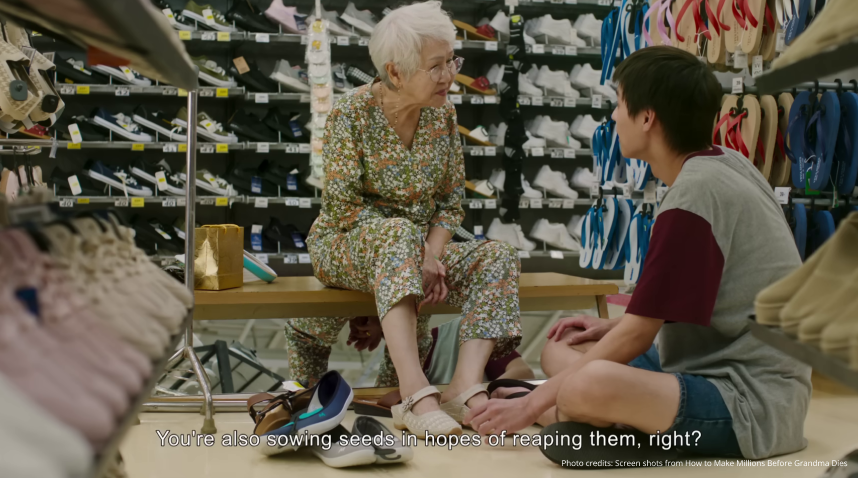
At first, M embraced the role of the dutiful Grandson, expressing his desire to be a “full-time Grandson” and help Ah Ma with her congee stall business. However, M’s perspective shifted when Ah Ma mentioned the need to wake up at 5 am, leading to the following hilarious exchanges:
M: Why so early?
Ah Ma: The early bird gets the worm.
M: The worm that wakes up early will be gobbled up first. The worm that woke up late survives.
Greed is the motivating factor that energizes M to be closer to his Ah Ma. This explains M’s previous careless attitude and behaviour, like “microwaving the water” instead of using a kettle, showing little regard while cleaning Guan Yin’s altar, and buying beef soup for Ah Ma without realizing that Ah Ma does not eat beef.
These instances humorously highlight how we sometimes neglect to show proper respect and care toward our elders when completing tasks for them.
In Buddhism, Right Effort is part of the Noble Eightfold Path. What would count as Right Effort in this context? M’s mother exemplified Right Effort by rescheduling her work shifts to join Ah Ma in aquatic exercises, accommodating Ah Ma’s chemo appointments in her busy schedule, and wholeheartedly attending to Ah Ma’s needs, purely out of love without concern for inheritances.
M’s initial thought was that his mother was also working hard to curry favour to be in Ah Ma’s good books, but he stood corrected.
In summary, Right Effort is not the mere performance of the acts of wholesome deeds but rather also the wholesome mental states behind them. Arising wholesome mental states (caring for Ah Ma) and abandoning unwholesome mental states (disregarding inheritance as a motivating factor for caring).
Gratitude
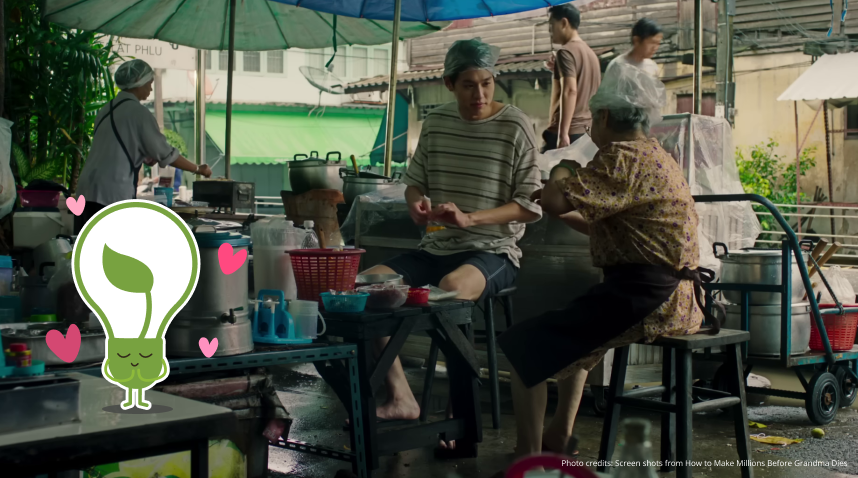
Gratitude is a big word, yet it is subtly depicted in the movie’s day-to-day scenes. The simple moments in life remind us to value each other’s presence.
In a particular scene where M and Ah Ma are preparing bags of vinegar for takeaways:
Ah Ma: You’re not doing it tight enough.
M: If it’s too tight, the vinegar will suffocate.
Ah Ma: Chuckles and laughs at M’s comments.
Many Asian children consider it a sacred duty and responsibility to provide their parents with pocket money while working. Therefore, it pains me and makes me feel “bad” that I am unable to support my parents financially during my 1-year unemployment period.
I ended up spending more time in Singapore than in my hometown of Malacca with my elderly parents because I felt awkward and uncomfortable relying on them for food at home.
This movie makes me realize that the greatest gift that our parents want from us is Time!
During a discussion with M’s cousin, who inherited a fortune, M’s cousin remarked, “Do you know what old people really want, but none of their offspring can give it to them? Time.”
Our elderly parents and grandparents do not need fancy vacations or material goods from us; they crave our undivided time or whatever time we can spare.
In a society where we must earn a living, sustain a lifestyle, and offer material comfort to ourselves and our loved ones, the true joy and happiness our loved ones seek lie in the moments we share in our time spent with them.
We might initially hold certain misconceptions and motivations when spending time with our loved ones, particularly concerning money and inheritances.
However, as the movie unfolds, we learn that with Ah Ma’s love and compassion, even the obnoxious and greedy M can undergo a positive transformation. Let us brush off the impurities of our heart, for we all naturally have the Buddhanature as our birthright; we simply need to re-discover it again so it can “Shine bright like the Diamond!
Sukhi hontu – May you be well and happy.
Wise Steps:
- It’s important to spend quality time with our elderly grandparents, parents, or other elderly relatives/friends. To echo Angie Chew’s sentiment, “Their tomorrows will be lesser than their yesterdays.”
- Expressing our love and gratitude to our loved ones should be a regular practice. If saying “I love you” feels challenging, imagine how much harder it would be when they are no longer around.

